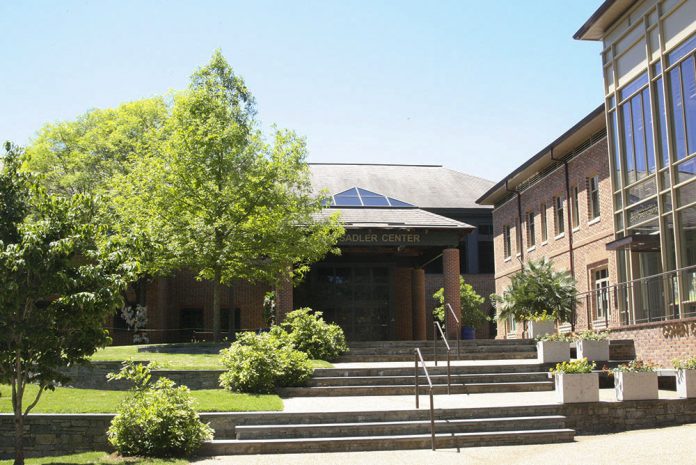Monday, March 4, the College of William and Mary’s Tribe for Life organization hosted Students for Life of America spokesperson Lydia Taylor for the first stop of her three-part “Not Your Body, Not Your Choice” campus speaking tour, focused on advocating against abortion. The event, held in Blow Memorial Hall, included a twenty-minute brief by Taylor where she outlined her pro-life stance, followed by a 90-minute Q&A session with the audience.
Taylor, a junior at Campbell University, currently serves as SFLA’s social media content creator coordinator intern as well as president of the national organization’s Campbell chapter.
The pro-life ethos shared by SFLA and Taylor prioritizes ending abortion in the United States while also supporting underprivileged mothers by connecting them with resources and assistance.
“We think that there’s always something better we can do for women besides advocating to kill their child,” Taylor said. “There’s always more we can do. There’s always a better solution than ending the life of an innocent child. We can support that woman by connecting her with one of her pregnancy centers, with Standing With You, giving her free access to resources like diapers, formula, parenting classes, any support she needs. We want to come alongside of her.”
Earlier in the day, Taylor joined Tribe for Life for a brief tabling session outside of Sadler Center; however, most students looked forward to the discussion that would unfold later that night.
In general, attendees of both pro-choice and pro-life backgrounds came to the event with an open mind.
“I’m looking forward to perhaps exposing myself to a new perspective,” Arab Bagga ’25 said. “I’m pro-choice, but any new arguments that I can adopt that are pro-choice or are against, I’m happy to hear new thoughts with that.”
Philip Vayntrub ’27, secretary of the College Republicans, attended to strengthen his pro-life convictions and learn how to engage more effectively on the topic.
“I want to get engaged because I think I’m on the side of justice and truth,” Vayntrub said. “And I think if we communicate that better and we talk to people, we can really speak to them. And if people open their hearts, they’ll hear that.”
Taylor’s brief focused on debunking the most common misconceptions, according to her, used in pro-choice arguments.
“So tonight, I kind of want to go through all the misleading terms that pro-abortion supporters use to disguise abortion because, as it turns out, even though they are abortion supporters, they’re actually scared to use the word ‘abortion’ when they talk about it,” Taylor said.
Taylor attempted to debunk the notions of abortion as healthcare, abortion access as part of women’s rights advocacy, abortion as a means of reproductive freedom and abortion as a means of the woman’s bodily autonomy.
She first argued that pro-life individuals are not against medical treatment, such as inducing labor or performing a C-section for life-threatening pregnancies because doctors can always make an attempt to save both lives in these types of treatments.
“However, in every single situation, regardless of what stage of pregnancy, the doctor can always make an attempt to save both lives,” Taylor said. “There’s always an opportunity to either induce labor or perform a C-section… there is a huge difference between performing and adoption, or a C-section to try to save both lives, and intentionally performing an elective abortion to intentionally poison, vacuum or dismember a baby based on them being inconvenient to the mother.”
When discussing abortion access as part of women’s rights advocacy, Taylor claimed that abortion often hurts women because most go in with false expectations or are pressured into obtaining one. Reportedly, the procedure often leads to increased rates of depression, anxiety and suicide.
“Eighty-seven percent of women who have had abortions felt some sort of pressure into it,” Taylor said. “We are told that abortion is this empowering choice for women, that women just absolutely feel amazing after. That it will be safe, easy, effective when in fact the majority of women are being pressured into it by a boyfriend, their parents or society as a whole that tells them that they can’t be successful as a mother.”
The Flat Hat cannot confirm this statistic.
Following her brief, Taylor opened the floor to questions. In parts, she reiterated her “pro-women” rhetoric and emphasized the equal accountability held by fathers. Other up-and-coming issues, such as IVF and artificial wombs, were discussed.
Tribe for Life President Darrison Haftarczyk ’25 left the event feeling hopeful about fostering a better connection between both sides of the abortion debate in the future.
“It is really nice to understand where people are coming from in order to have better conversations and better reach each other and facilitate relationships because I do believe at the end of the day, both pro-life and pro-choice, we want to help women,” Haftarczyk said. “We just have different ways of coming about it.”

